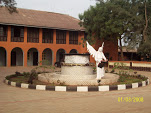THE MAN OF THE MOUNTAINS…
 In preparation for His passion – that ugly sight and
experience which only the most sublime level of Love can bear – Jesus did
always go up to a lonely place, preferably a mountain, to pray. Prayer is ‘being
in communion with God’, and that is what Christ made his habit. Hearing the
voice of the Father speak to us; listening, and speaking when required to, this
is what prayer consists in. There is a certain kind of aura that surrounds the
art and science of prayer. And this is capable of holding one down to the
experience. Prayer is not result-based, though it is a science. It is not
duty-based, though it is an art. It is a personal encounter, yet its
authenticity does not depend on any subjective judgment. When Christ wore
prayer about Him like a cloak, He’d made it His art and science, such that He’d
mastered it, and it, Him. He then enjoyed it that it became His food, or
rather, the air that He breathed.
In preparation for His passion – that ugly sight and
experience which only the most sublime level of Love can bear – Jesus did
always go up to a lonely place, preferably a mountain, to pray. Prayer is ‘being
in communion with God’, and that is what Christ made his habit. Hearing the
voice of the Father speak to us; listening, and speaking when required to, this
is what prayer consists in. There is a certain kind of aura that surrounds the
art and science of prayer. And this is capable of holding one down to the
experience. Prayer is not result-based, though it is a science. It is not
duty-based, though it is an art. It is a personal encounter, yet its
authenticity does not depend on any subjective judgment. When Christ wore
prayer about Him like a cloak, He’d made it His art and science, such that He’d
mastered it, and it, Him. He then enjoyed it that it became His food, or
rather, the air that He breathed.
It was on a Monday, and in six days’ time, He would make His
Jerusalem entrance. It was obvious that, despite the Caesarea Philippi
declaration (by Peter), the disciples still have a lot to know about Him. By
implication, they did not know Him yet. He had to show something of Himself
that can actually convince any average man that what is said of Him, as the Son
of God, is true. As usual, with Him at the mountain were the normal three, and
they considered it business as usual, until something happened. From four
persons, one could now count six in the area – the other two they identified as
Moses and Elijah. Yet again, there was a Jesus quite different from the
carpenter’s son. He looked like a god, though they haven’t seen one before, and
this sight made to frighten them, but also they were enjoying it. It wasn’t the
sight of Moses and Elijah; it was the sight of the glorified Son of man that
they were relishing. After all the two aliens (so to say) were rather privileged
to behold Him face to face – that is what they prayed all their life for, to
see the face of God. The disciples were there as witnesses, so were Moses and
Elijah, but the most important and the Witness par excellence was the voice of
the Father. For the second time in Christ’s earthly lifetime, it confessed His
Divine Son-ship to those around, including Moses and Elijah. Not just as ‘my
Son’ was Christ introduced, but ‘My Beloved Son’. We are all children of God by
creation, but are we ‘beloved sons and daughters’ of God. It’s a two-way
traffic: the lover MUST also be the beloved or vice versa.
Now, what message was Christ passing to us by the very act
of His transfiguration? Is that a proof of His Godhead? I wouldn’t tell, but He
bids us come to Him, or rather with Him. If we do, we will see even greater
things more than the disciples saw. Do we want to be transformed? Then we got
to take to the Mountain. The mountain is a place of Divine interaction and
Koinonia; it is a place we buy, without money, wine and milk to cheer our
hearts; and where our scarlet robes are washed the whitest. It is a place of
robbing minds with God, with the Father; it is a place of Prayer – forget the
modern man’s approach to Prayer. The disparity between the mountain and the
valley or the plain is that, water flows down the former to the latter, and
that is a Christian’s attitude: he, like Christ, goes up the mountain to hear
from the Father; to acquire the Divine power and strength, to replenish the
used and worn-out energy; then he comes down to administer to the people of
God. This is the work of the Prophet (remember Moses?), and the man of the
mountains is a prophet, or rather, a prophet is a man of the mountains. Do we
want to be transformed? If our answer is a yes, then we must take to the
mountains too. At Mount Sinai, Moses’ face was transformed; at mount Horeb, his
perception; at mount Olives, it was Christ; at Calvary, the fate of man was
transformed by the one hanging on the cross; at the Olivet, Christ was taken
up. Has this shown the importance of mountains in a Christian’s life? You can
tell better, but the mountain should always be our place of refuge. It is also
a place of Transformation.
Many things take place on the mountain. Peter saw this and
wanted to stay there forever. That is the feeling, but let’s not be carried
away by what we experience on the mountain. Remember! The experience is not
just for you. It is meant to be shared. When we leave the mountain, it is just
for a while. We’re going down to put into action, what we have been told; to
give out that which we have received. When we’re done, then and only then will
we have a chance to be on the highest of the mountains, Mount Zion, the Great
King’s City – Ebe ihe nile na-eme…
I
CHRIST CANNOT BE
COMPARED!
W
|
ith who? To whom? And by whose
measure? Christ is the master of His arts, who though uses the art, but can
still make impacts without it. He is human, and at the same time, Divine. Who
else is? As God, He knows everything; as man, He does/did everything right. Who
else has done all things right? David was a king after God’s own heart, but he
got involved in sexual immorality with Bethsheba, and further killed her
husband. For this reason, he repented and sought for forgiveness. Christ could
never repent… of what? For what? He is always one with the Father and does His
will because He knows them. Not that He never saw temptation; in fact, He was
tempted more violently, and at more strategic places than us. Little wonder
when He said, “My food is to do the will of (my Father) that sent me”.[1]
He sits beyond any comparison
whatsoever (nimpotquelle). He wants us to be incomparable, at least with the
world. It is in comparing ourselves with the world that, at times, leads us to
sin, to self-love, and to think we’ve done enough. We should teach the world,
and not learn from the world. In the latter, we are bound to fall.








No comments:
Post a Comment